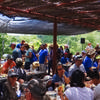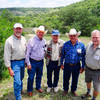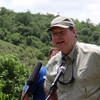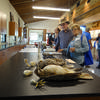



You couldn’t blame the guests at Sunday’s Bamberger Ranch Preserve Annual Family Picnic if they didn’t believe host J. David Bamberger when he told them that there was no water on the 5,500-acre Selah property when he purchased it in 1969. After all, the 2.9-mile drive from the main gate to The Center where they were standing took them over or through five crystal clear streams and along the shores of Madrone Lake.
They likely didn’t believe him either when he said he bought the place because, “it was the worst-looking property” he could find – these hills were lush with native grasses, wildflowers, oaks and pecans, all sparkling from recent rains.
But they had to believe it when he said he had never wanted to be, “that CEO that stayed on the job too long…that coach that hadn’t prepared a sub for his quarterback.” After all, as the keynote speaker at the celebration of 50 years of his life’s work he kept the stage for five minutes before turning it over to newly-named Board President Rusty Yates, who took over leadership in December 2018.
It’s not that Bamberger shies away from public speaking or doesn’t make the most of every opportunity to share his passion with people. In fact, throughout the day-long event he could be seen among the guests young and old reminiscing about early years at the ranch with former staff members in attendance, identifying a plant for a group of children, even singing with the band at one point. At 91, he has stepped aside in his direct leadership of the ranch, but he certainly doesn’t seem to have slowed down.
In his address, Yates referred to Bamberger and his staff as “Texas Conservation Heroes.” He reiterated that the goal of the Board of Directors is to ensure that the Bamberger Ranch Preserve remains in its current state restored to its original habitat and used to teach ethical land stewardship by example and outreach in perpetuity.
“Open-space preservation is the number one terrestrial environmental challenge we face,” Yates said. “Texas loses agricultural and rural properties faster than any state in the union. J. David is 100 percent invested in this. He has made it his life’s work to restore this land and given it to us to care for. We are committed to its success.”
A surprise guest at the event was Executive Director of the Texas Parks and Wildlife Department Carter Smith. To his surprise he was invited onstage to address the audience and reflected on the importance of the work at Bamberger Ranch.
“When I think about Selah ,I think about the wonderful sense of place,” he said. “It is so special to all of us as Texans. I think about the fact that our culture and our identity are defined by the wonderful mythology around these wide-open spaces and these vast places. It’s who we are – it’s what we love about our home.”
In attendance to celebrate the 50th anniversary were Bamberger’s “Four Aggies” who joined him in the early stages of the restoration and according to Bamberger built the foundation for the success of the undertaking. Of the four, Jim Rhoades, the Tree Aggie (arborist); Buddy Francis, the Cow Aggie (livestock manager); Randy Lenz, the Deer Aggie (wildlife manager); and Leroy Petri, the Dam Aggie (ranch engineer), only Petri, who is not actually an Aggie (but J David enjoys a good story) is still on staff. He has 49 years of building roads, dams, lakes, gates and equipment at Selah to his credit.
Commitment seems to be a watchword throughout the staff illustrated by the lengthy terms of service. Executive Director Colleen Gardner is in her 20th year; Ranch Manager Steven Fulton is in his 16th year and with his wife is raising two children who have called Selah “home” since birth.
These key players at Selah, as well as dozens of blue-shirted volunteers, bearing Bamberger’s personal motto “Keeping Nature Pure and Simple,” shared their love of the land with the visitors. Hundreds of guests enjoyed a catered lunch and a day full of activities guided wagon tours, nature hikes, fishing, kite-flying and children’s craft projects.
Morning tours provided views of fossils in their natural state, scimitar-horned oryx bred back from near-extinction in a joint effort with American Zoological Association, and the widely-known Chiroptorium (man-made bat cave) that is home to an estimated 200,000-plus Mexican Freetail Bats.
Afternoon tours offered guests the opportunity to tour the Margaret Bamberger Research and Education Center, which opened in 2018 and honors Bamberger’s late wife, who he calls “the muse and catalyst for the educational programs” at Selah.
Back at The Center there was a silent auction, raffle and the music of Bill Oliver and the Otter Space Band. Their rendition of “Ode to the Bamberger Ranch” provided a fitting finale with J. David onstage singing and dancing with the band.
At one point during the afternoon Bamberger found a spot in the shade, sat down to catch his breath and shared some of his personal story. He was quick to admit he has led an unexpectedly blessed life. He grew up “penniless, dirt poor” in Ohio’s Amish country where his mother instilled in him a love for nature on their daily walks.
“We had nothing else to do, no electricity or running water until I was five, so we spent our time outside,” he said. “There was a time when I could name every plant and every bird.”
A brief stint in the Army gave him funds for college, but few job prospects once he earned his degree. He took the best offer selling vacuum cleaners door to door but moved with his wife to Texas in part to escape the derision of his family who expected “the first and only one to go to college” to be more gainfully employable.
He couldn’t find better work, so he just worked better and expanded his Kirby vacuum business in San Antonio to a staff of 52 sales people, including one Bill Church. Church later inherited three family chicken restaurants while he was an employee and left to run the businesses. He was back soon enough, though, asking Bamberger for help making his payroll. After several more bail-outs the two joined forces: Church providing the knowledge of chicken frying and Bamberger providing the financial acumen and innovation.
One of the first franchised restaurants in the country, Church’s soon had stores throughout Texas and eventually the country. Bamberger tells the story of duct-taping a three-sentence business proposition to the arm of the company pilot and sending him on the Lear Jet to Bentonville to deliver it to Sam Walton.
“I said ‘Don’t come back until Mr. Walton has read this,’” claims Bamberger. “Mr. Walton was out of the office for the week and his assistant called me begging me to bring my guys back. The co-pilot was this good-looking young guy and none of the women in the office were getting any work done!”
She promised the note would be the first thing her boss would see upon his return.
“I got a call from Mr. Walton Thursday afternoon and we set up the deal, an agreement for 30 Church’s restaurants on Walmart properties in Texas,” he said. “That was it--a handwritten proposal with duct tape on it, one phone call and we had a deal worth millions. You could do that back then!”
As his personal wealth grew so did his yearning for reconnecting with nature and soon, he was searching for that ‘worst-looking piece of land,’ which he found in Blanco County, south of Johnson City, spanning 5,500 acres from Miller Creek Loop to Flat Creek Road.
Bamberger is quick to laugh at himself and regale with stories of early market research that consisted of picking a page out of a Texas atlas and pointing a finger with eyes closed to select the next Church’s location and roller skating through Walmart parking lots picking up trash with Church’s staffers.
His personal disclaimer is “None of this may ever have happened, but I promise it’s all true!” He is equally quick to share the story of Selah and the journey of the past 50 years of spotting the first spring nearly three years after the restoration started, and forging on despite the speculation from soil, groundwater and wildlife specialists who did not understand his vision or resolve. He put his life’s work into a trust in the interest of educating others about ethical land stewardship.
“J. David and his staff, past and present, have been the catalyst, the enablers and the inspiration for so many private landowners around the State to take care of this wonderful homeland that all of us get to enjoy,” Smith said. “On behalf of the staff of Texas Parks and Wildlife and the people of Texas – thank you!”



